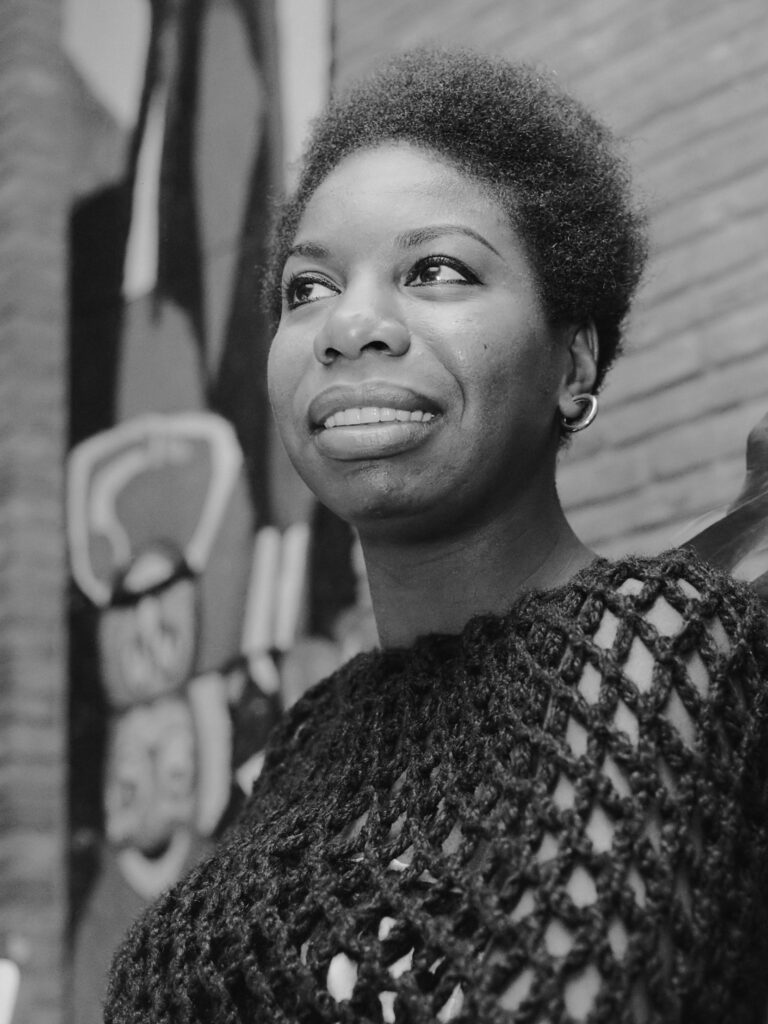Artists like Nina Simone have had a profound and enduring influence on youth culture through the decades in several ways. Nina Simone was deeply engaged in social and political issues throughout her life, using her voice as a renowned singer and songwriter to advocate for civil rights, human equality and social justice.
“As far as I’m concerned, it’s their choice, but I CHOOSE to reflect the times and situations in which I find myself. That, to me, is my duty.“
Nina Simone, Source
Artistic Expression & Social Activism and Her Unique Art
Her music, along with that of other black artists, has been a source of inspiration for generations of young people. From her soulful vocals to her powerful lyrics addressing social and political issues, her music has resonated with youth seeking authenticity and meaning in their artistic expression. Her influence can be seen in various genres, including soul, jazz, R&B, and hip-hop, where artists often sample her work or draw inspiration from her style and message.
“And at this crucial time in our lives, when everything is so desperate, when everyday is a matter of survival, I don’t think you can help but be involved. Young people, black and white, know this. That’s why they’re so involved in politics.”
Nina Simone, Source
Simones Cultural Identity and Pride
BPoC artists like Nina Simone have been at the forefront of social and political activism, using their platforms to raise awareness and advocate for change. Their activism has inspired youth to engage in social justice causes, whether through protest, advocacy, or artistic expression. The Civil Rights Movement, for example, was fueled in part by the music and activism of artists like Simone, whose songs became anthems for the movement and inspired a new generation of activists.

*14 december 1965, Source: Nationaal Archief
Author: Ron Kroon for Anefo
Black artists have played a crucial role in shaping cultural identity and pride among youth, particularly within black communities. Their art reflects the richness and diversity of black culture, celebrating its history, traditions, and resilience in the face of oppression. By showcasing the beauty and complexity of black experiences, artists like Nina Simone have empowered young people to embrace their heritage and take pride in who they are.
Representation and Visibility in politics and culture
Black artists have helped to challenge and disrupt mainstream narratives about race, identity, and beauty, providing much-needed representation for black youth in popular culture. Through their music, films, and other forms of artistic expression, they have shown that blackness is not monolithic and that there are many ways to be black in the world. This visibility has been empowering for black youth, affirming their existence and validating their experiences in a society that often marginalizes or erases them.
“We will shape and mold this country or it will not be molded and shaped at all anymore. So I don’t think you have a choice. How can you be an artist and NOT reflect the times? That to me is the definition of an artist.”
Nina Simone, Source
Personal Statements
Overall, PoC artists like Nina Simone have had a profound and multifaceted influence on youth culture, shaping not only artistic expression but also activism, identity, and representation. Their legacy continues to inspire and empower young people to challenge the status quo, embrace their heritage, and strive for a more just and equitable world. Examples for her political statements are:
“Mississippi Goddam”
This song, released in 1964, is one of Simone’s most famous protest songs. It was written in response to the assassination of civil rights activist Medgar Evers and the 16th Street Baptist Church bombing in Birmingham, Alabama, which killed four African American girls. The song directly addresses the racial violence and injustice prevalent at the time, and it became an anthem for the Civil Rights Movement.
Montreux Jazz Festival Speech 1976
During her performance at the Montreux Jazz Festival in Switzerland in 1976, Simone delivered a powerful speech about racism and oppression. She spoke about her experiences as a black woman in America and expressed her frustration with the ongoing struggle for civil rights. The speech was captured on film and is available for viewing online.
“To Be Young, Gifted and Black”
Simone wrote this song in 1969 in honor of playwright Lorraine Hansberry, who wrote the play “A Raisin in the Sun.” The song celebrates black identity and encourages pride in one’s heritage and abilities. It became another anthem for the Civil Rights Movement and continues to be an inspirational song for marginalized communities.
Interviews and Public Statements
Throughout her career, Nina Simone gave interviews and made public statements expressing her views on a range of social and political issues. She was known for her candidness and fearlessness in addressing topics such as racial inequality, police brutality, and the need for social change. Many of these interviews and statements are documented in books, documentaries, and archival recordings.
Sources:
- “Nina Simone: Four Women” documentary by Christina Kallas (2018)
- “What Happened, Miss Simone?” documentary directed by Liz Garbus (2015)


You must be logged in to post a comment.